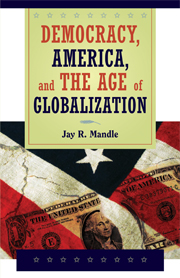3 - The Funding and Bias of American Politics
Published online by Cambridge University Press: 14 May 2010
Summary
As we have seen, the U.S. income distribution is markedly more unequal than that of comparable European countries, and that inequality during the past twenty-five years has increased more in this country than anywhere else except the United Kingdom. Our country's poor performance in this regard did not occur because the pattern of rewards that emerges from markets is markedly different from that of the rest of the developed world. What fundamentally sets the American experience apart is the degree to which government spending policies offset the inequalities that emerge from markets. The political process in the United States does far less than that of other countries to counteract inequality. In this regard it is particularly noticeable that the United States lags behind other countries in developing programs to assist workers dislocated by globalization and/or technological change.
Despite this, there has been very little discussion in the United States about how to reverse the trend toward increasing inequality. It is as if, as Bill Moyers has put it, “equality and inequality are words that have been all but expunged from the political vocabulary.” Why is that?
One possibility is that that this political failure simply reflects the preferences of the electorate. It might be that there is a powerful popular consensus in the country that believes that redistributive policies are wrong in principle and should be eschewed. If that is the case, our uneven income distribution would reflect the democratic will of the people.
- Type
- Chapter
- Information
- Democracy, America, and the Age of Globalization , pp. 43 - 60Publisher: Cambridge University PressPrint publication year: 2007

